In this post I want to talk about a fundamental aspect of SEO positioning, conducting a Keyword Research, the search and analysis of keywords should be the basis of the SEO of any website.
One of the most important stages of search engine optimization is the realization of a list of target keywords. For your SEO optimization work to be successful you must position your website with the terms that your potential customer would use to search for your website.
The first thing you need to know is what types of Keywords exist, they can be classified based on two factors.
Table of contents
Search intent of your user or potential customer
Google offers you a tool about search trends called Google Trends. This tool allows you to compare trends for different search terms. This way you can compare the popularity of a term with its search trend.
- Informative: The user is looking for information. Example: hotels in Madrid
- Transactional: The intention is to complete a transaction, whether it is to make a purchase or download content.
- Navigational: Searches aimed at finding a specific web page. Example: facebook, linkedin, etc.
Keyword search volume
The search volume classifies the keywords according to the number of searches performed, can be divided into three groups.
- Head: These are very generic searches with a high competition and search volume. Example: hotels, houses, etc.
- Middle tail: More specific searches, but also very generic. Example: hotels in Almeria, cheap hotels.
- Long Tail: This is where the greatest opportunities are agglutinated since more than 70% of searches are of this type, very specific searches with little competition. Example: Offers cheap hotels in Madrid, best cheap hotels in Almeria.

How to make my strategy for keyword research
Now that we know what types of keywords exist, we can start thinking about what is best for my website.
You might think that it would be best to focus on the keywords that attract the most traffic, but if you are starting with your website you will realize that it is very difficult to position a keyword in the first search results when there is already an established competition.
The Long Tail can make the difference for a website to start positioning, since more than 70% of searches are performed with a Long Tail Phrase or Long Tail, also the traffic that arrives by generic words have a worse conversion.
A Long Tail allows us to refer in a much more concrete and specific way the work done by our company.
Let’s imagine that you have an Ecommerce selling t-shirts that has managed to position itself for the keyword “sports t-shirts” in one of the first search results. This will attract a lot of traffic, but it won’t have a good conversion rate, that is, we can’t be sure that the user will make a purchase.
He may be looking for very generic information, while the search “Cristiano Ronaldo sports jerseys” may bring us fewer visitors, but it is certain that it will be a person with purchase intent and therefore the conversion rate is much higher.
What is Keyword Research for
You may think that the performance of a Keyword research SEO, only influence our organic positioning in search engines SEO, but a keyword research can affect other aspects.
- Increase profitability: The increase in organic traffic has a direct relationship with the increase in profitability, so when conducting a study of keywords should assess the cost of investing in a Keyword or another.
- Attract traffic to the website: Using the right keywords that can better position and better define your business can significantly increase your traffic on search engines and RRSS.
- Improve offline and online communication: Understanding and connecting with potential customers is the fundamental objective of Keyword Research. Understanding the words or set of words that are in the user’s mind will help us to make a good impact.
Steps to perform a good Keyword Research
Brainstorming (Brainstorming)
You can start by writing a list of terms that describe your market in a generic way, always putting yourself in your potential customer’s shoes and thinking about what words they would use to search for exactly what you offer.
You can contact one of your clients and ask them for a list of the terms they would use to search for you through a search engine.
If your website is of interest to a certain geographic area, include the area (be it city, province, location) among the keywords in your list.
Ask your personal contacts who are not familiar with the technical terms your industry uses to provide you with a list of expressions they would use if they wanted to find your products or services. Ask them that these expressions contain between two and five words, and above all that they don’t think too much, as users don’t spend a lot of time thinking about the terms to use in a search.
This will help us to understand how your potential client thinks when performing an SEO search.
Tools for a good Keyword Research
Google Keyword Tool
To complete your list of keywords you can use the suggestion tools provided by the Internet. I recommend that you start using a free tool that Google provides us, called Google Keyword Tool, will allow us to search for keywords.
This tool offers alternative terms to those you already have in your list, as well as certain metrics of interest as the volume of searches in a given period. In this way you can add terms that seem of interest to you and that you did not initially write down.
Related searches
Google offers us a function called Related Searches, which appears when a search is performed in the search engine. This can help us to find new terms that we had not previously taken into account.
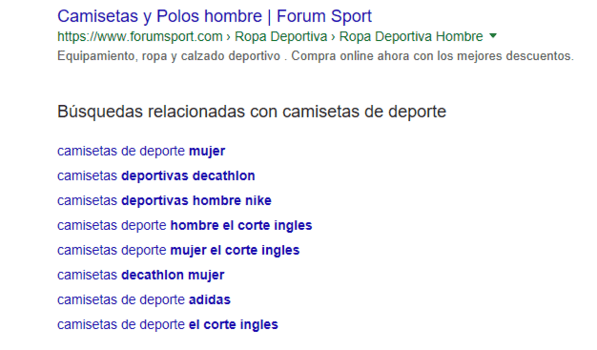
Google Instant
This is a Google feature that automatically shows us results as we type, suggesting terms simultaneously, based on the most used words containing the characters that the user has used in the search box.
Start typing the most generic terms from your list and see what terms appear, you can add those that seem interesting and related to your content.
This can be very useful for adding terms to your list and keyword analysis. This function is also available on Yahoo and Bing.
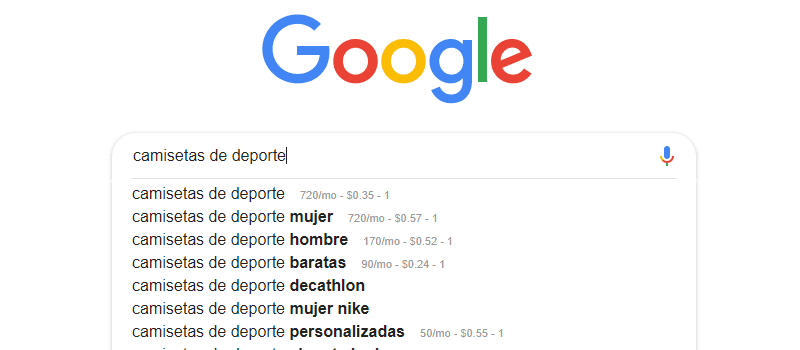
Tool; “Semrush”
This tool is paid, but its free version provides enough data about target terms and competitors. Such as trend, searches, CPC and SEO difficulty of a certain keyword.
This data is very interesting for Keyword Research.
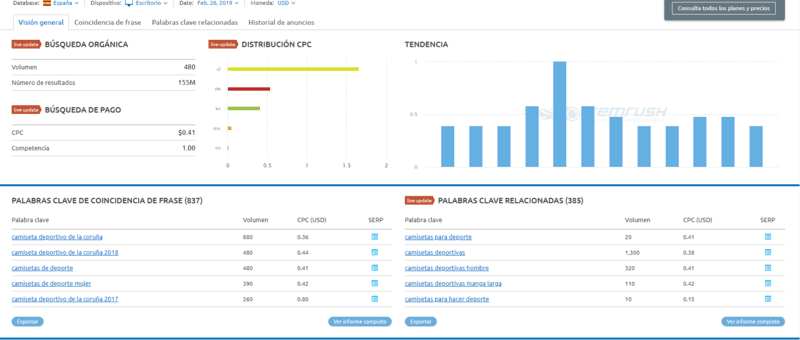
Google Adwords / Google Keywords Planner
This Google tool has a feature that can help us to carry out our keyword analysis. The Keyword Planner or Keyword Planner.
To access this feature of Google Adwords, first we have to log in to the tool and immediately we can create a test campaign, this way we will have access to the keyword planner, This keyword planner will show us possible search results based on a term that we will previously put.
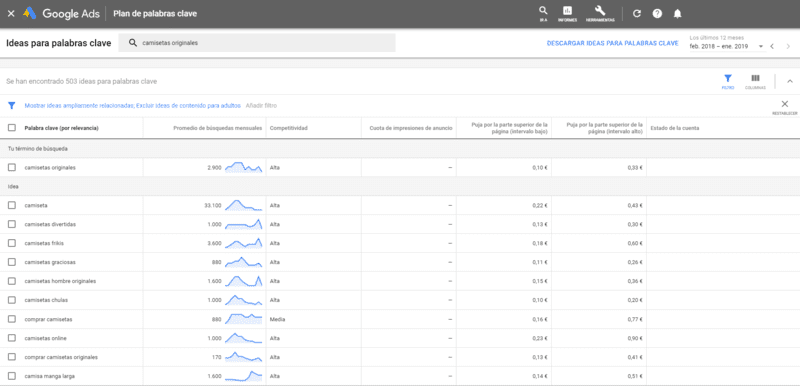
Ubbersugest
This is an extremely useful tool, very easy to use and will save you a lot of time. It acquires data from Google, giving us a very complete list of possible keyword combinations.
This tool can give you business ideas or ideas on how to attract traffic.
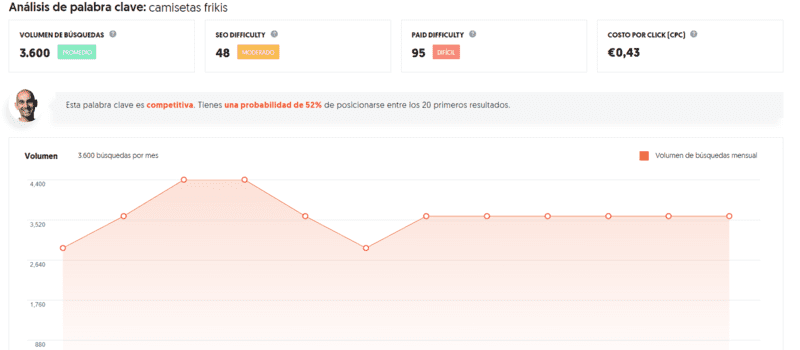

Competitor analysis
Competitor research is a key factor in determining your target keywords. Not always the competition in your traditional market is the same as the competition in search engines.
It is important to draw up a list of your main competitors in the traditional market and locate and locate the website of each of them.
Once you know the official website of your competitors, you can use the Semrush tool to find out what terms these competitors are ranking for by typing in your competitor’s website, selecting the search engine and clicking on the organic keywords option.
Add to your list those terms that your competitors are ranking for and can be effective for your SEO strategy.
With the Semrush tool you can find your competitors. Type in the web address of your own business and click on organic competitors. You can also find your competitors online by performing Google queries for terms that describe your industry.
Analyze the titles your competitors use both in the traditional marketplace and in search engines so you can pull new terms for your listing.
Valuing your listing terms
The factors to take into account to establish the terms that will make it to your final list are as follows.
Popularity:
This is the number of times a term is typed into a search engine by users. It is a determining factor when deciding whether to go for one term or another.
There are tools to know the popularity of a term, you can use the tool you have already used for Google suggestions (Google Keyword Tool), but this time you will check the number of searches that according to Google have been made for each term. You can filter these results by changing the match from Broad to Exact.

Competition:
The competition for a term is the number of results that appear when that term is used as a query in a search engine.
The lower the competition for a term, the easier it will be to rank for that term.
Depending on the competition in a certain sector it can be more or less difficult to rank for the most popular terms.
If your company is located in a very generic market, there is too much competition for your popular terms and you are not a leader in your sector. Therefore it will be convenient to use less popular terms, which will provide you with fewer visits, but it will be more viable to obtain good rankings.
You can relate the popularity of a term to its competition.
Conversion effectiveness:
The goal of all positioning is to get more visits through search engines, try to get each organic entry of a user to convert into a customer.
Generic terms can produce many visits but few conversions, on the other hand Long Tail Keywords produce fewer visits but they do have a great conversion, as they are more specific in relation to the product or service offered by your business.
Performing a Keyword Research and keyword analysis are nothing more than a means for your project to achieve the objectives set, not the positions. Remember that search engines do not show the same position for a term to all users.
Therefore, although measuring the position of a term for a particular search engine can serve as a reference, what you should really measure is whether that term performs its function correctly and brings you sales, traffic or any goal you have set.
Conclusion
In order to make a definitive list of target terms, meet with the Marketing department and use the methods that have been explained in this post, spend the necessary time to perform the task correctly
The realization of a good Keyword Research is a means for your project to achieve the objectives set, not positions, remember that search engines do not show the same position for a term to all users.
For this reason what you should really measure is whether the term is fulfilling its function correctly, if it brings you traffic, sales or the objectives you have set.




Deja un comentario